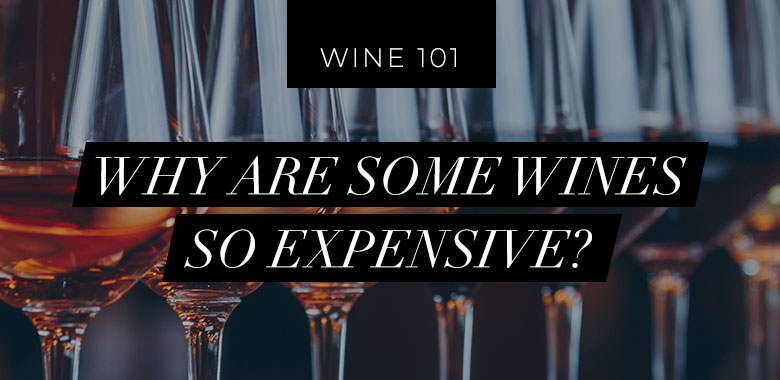
Wine
Why are some wines so expensive?
If you’ve been drinking wine for any length of time, it couldn’t have missed your attention that some wines are very affordable… and others less so, at $95 and over!
What makes these wines different, and what determines how much you pay for it? Let’s take a look!
WINEMAKING
No two ways about it, making wine costs money – and if you’re a vintner, your investment of time and labour, at every step of the way, needs to be recouped somehow.
Winemakers are required to balance a number of different factors to determine the cost of their final product. For one, there is the yield of a given vineyard. Lower yields generally mean better quality fruit (and ultimately, wine), but this comes at a cost to the winemaker’s volume potential.
Then there is the kind of approach a winemaker might take in the vineyard and winery. Handpicking, for instance, is more expensive than machine harvesting. Fruit sorting is also a cost consideration – it ensures only the highest quality fruit is selected, but is an investment in time and labour, that again reduces the grape material able to be used.
Winemakers must also determine when to make the cut on the press. Free-run juice is the purest and highest quality, but as with fruit sorting, reduces overall volumes. As the best wines are usually made only from outstanding parcels or barrels of fruit, this process of classification and selection has implications both for the quality of the wines produced, and their cost to the consumer.

SINGLE VINEYARD PRODUCTION
Single Vineyards are defined not just by boundaries, but by legal parameters as well. Label integrity law asserts that 95% of fruit must be sourced from that stated vineyard to be classified as a Single Vineyard wine. This again places limits on overall output, and the resulting scarcity adds to the price. In addition, a single vineyard wine will only be made if the vineyard itself showcases a special or distinctive character that the winemaker wishes to express.

USE OF OAK
Winemakers use oak for a variety of reasons, including to provide polish, flavour and texture to the wine, and allow for some maturing. But oak barrels cost a LOT of money – in fact, around $2500 is the approximate cost (including delivery) of supplying a 225L barrique. The amount of new oak that is used in each wine thereby has an impact on costs – the more that is used, the more costs go up. Winemakers will often therefore use oak staves and old oak to manage costs, often in conjuction with new oak.

THE AGEING PROCESS
We all know the old saying: ‘Time is money’. This stands especially true for wine. It all comes down to opportunity cost. The longer a wine ages, the longer it is before it can be turned into money and cash flow. Not all aged wines are good or expensive, however. But as a rule the more premium wines that have higher production costs, as outlined above, and that are intrinsically of higher quality, are deliberately aged longer and will be correspondingly more expensive.

VINTAGE CONDITIONS
The conditions that each year present play a huge role in the quality of the fruit produced – and, by extension, the final price you pay at the bottleshop or restaurant. Great vintage years offer the opportunity to make the best wines, which can add value to the price thanks to the balance of supply and demand.

TERROIR
The hallowed French idea that every aspect of the grapevines’ environment influences the style and quality of fruit production plays a considerable role in establishing the market price of a given wine. Because it is so specific, and can be defined to small parcels of vineyard land, it is by its very nature finite. And as anyone who has watched an Antiques Roadshow could tell you, anything rare or finite attracts a premium, because it cannot be replicated.
Suffice to say, it is rare that a bottle of wine is not worth the asking price – even if you’re talking about the astronomical heights of an early Penfolds Grange or Mount Pleasant. Nonetheless, the beauty of Australian wine is that there is something that can be enjoyed at every price point, and even some wines that punch well above their weight in terms of their sticker price and quality.
As a general rule of thumb, a little familiarity with wine producers and labels, or the advice of a good sommelier if you’re dining out, will help assure you that you’ve made a good call on spending a little bit extra when you’re after something for a special occasion.
Looking for more Wine 101 tips and hints? Wine Selectors has you covered!